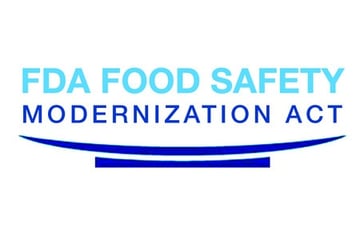FSMA compliance checklist is a resource food companies can use to guide their efforts toward meeting FSMA compliance and ensuring food product quality and safety.
Food producers who wish to export products to the U.S. must follow certain standards to ensure food safety and meet legal compliance. These guidelines were set in place as a result of the Food Safety Monitoring Act (FSMA), enacted in 2011, to prevent foodborne illnesses and ensure a safe, quality food supply.
Seven Components of FSMA Compliance
There are seven major components of FSMA compliance that companies must be aware of when it comes to meeting food exporting standards:
- Preventive Controls for Human Food
- Preventive Controls for Animal Food
- Produce Safety
- Foreign Supplier Verification Programs (FSVP)
- Accreditation of Third-Party Auditors/Certification Bodies
- Sanitary Transportation of Human and Animal Food
- Prevention of Intentional Adulteration of Food
Failure to comply with these standards can result in major fines, food product recalls, legal ramifications, and more; as such, it’s important that food companies take proactive steps to ensure compliance – particularly as the food industry continues to see stricter guidelines for food traceability and recordkeeping with the pending FSMA 204 decision.
FSMA Compliance Checklist
A FSMA compliance checklist is a resource food companies can use to guide their efforts toward meeting FSMA compliance and ensuring food product quality and safety.
Below are some considerations when creating your own FSMA compliance checklist:
- Know and Understand the Requirements. Does your team know and understand all of the requirements for compliance? It’s essential that each team member – from the food safety team to suppliers to leadership – knows their specific role or responsibility to ensure food safety.
- Assess and Reassess Current Food Safety Processes. Do you have a food safety program in place? Take time to assess or reassess the current processes in place. This is an opportunity to track your progress in meeting FSMA standards and acknowledge areas of strength or areas for improvement.
- Identify Potential Hazards in Your Food Supply. Biological, chemical, physical, and allergenic hazards can all contaminate your food supply. Take a proactive step to preventing food contamination and be aware of these sources – and ensure that your suppliers are aware, too.
- Implement Preventative Controls. The FDA’s New Era of Smarter Food Safety has shifted the industry’s focus from responding to foodborne illnesses to instead taking proactive steps to prevent them. For food companies, this means establishing written procedures for food safety, specifying actions within those procedures, and actively monitoring their progress and effectiveness. Make sure you have specific plans in place to accomplish this – being reactive in this industry is no longer an option.
- Prioritize Good Recordkeeping. How are you currently keeping track of your data – supplier information, FDA documentation, or audit and inspection details? Having a centralized system that can provide full visibility into your operations and easy access to proper compliance documentation on demand is critical.
Creating a FSMA Compliance Checklist can help ensure your company is prepared to meet industry standards and requirements. If your organization is looking for a platform to streamline your workflow, implement corrective actions, or centralize required recordkeeping, reach out to our experts at FoodLogiQ today.
Tag(s):
Industry Regulations
Other posts you might be interested in
View All Posts
Food Industry
4 min read
| August 9, 2017
At the Crossroads of Food Safety and Consumer Transparency
Read More
6 min read
| June 28, 2017
Product Traceability Under FSMA - How's Your Implementation?
Read More
Food Safety
6 min read
| August 9, 2016

